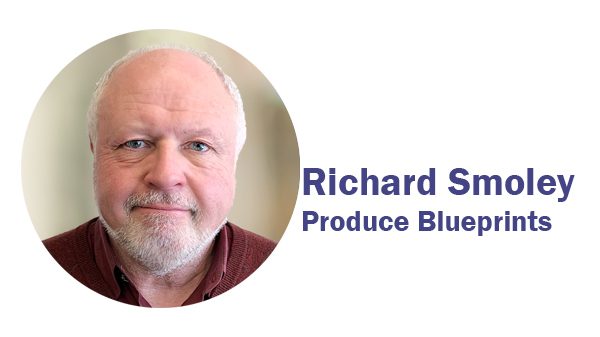Members of the Hazel Technologies team. From left: Natalia Param, postharvest laboratory manager; Jaime Kedrowski, marketing associate; and Patrick Flynn, cofounder and chief marketing officer.
A few days ago, I visited an incubator. Not for baby chicks. For technology.
It is a building on the campus of the Illinois Institute of Technology (IIT) in south Chicago. It contains thirty-odd businesses—many of them start-ups—focusing on the life sciences. The one I visited was Hazel Technologies, which is making a splash with its new product: a sachet you put into a box of produce to double its longevity.
The company was started in 2015 by four graduates of Northwestern University: Aidan Mouat, Patrick Flynn, Amy Garber, and Adam Preslar. Their goal: to reduce food waste. One way to do this is to make sure that fresh produce lasts longer, which is what the Hazel sachet is designed to do.
The product works by releasing “gases that have either antifungal or ethylene-inhibiting properties,” explains Flynn, cofounder and chief marketing officer for the company.
“It’s used elsewhere in the industry for fresh-cut dips and storage-level fumigations. We’re taking these types of treatments and downsizing them into a different delivery mechanism. The technical basis for all of our technologies is the slow and measured release of active ingredients from packaging.”
The product can double shelf life; “in some cases, we can exceed doubling shelf life,” Flynn adds.
The product has three other advantages: (1) “the pricing isn’t revolutionary; it’s at market standard” for the industry, Flynn points out; (2) ease of use: “it’s easy to integrate into the supply chain”; and (3) “it can work in the full supply chain, from harvest to retail.”
Uses of the Hazel sachet vary from crop to crop. Here are the ones for which the company has already devised uses:
Apple, Apricot, Artichoke, Asparagus, Avocado, Banana, Basil, Broccoli, Brussel Sprouts, Cantaloupe, Cherry, Dragon Fruit, Guava, Honeydew, Kiwi, Lettuce, Lychee, Mamey, Mango, Nectarine, Okra, Papaya, Passion Fruit, Peach, Pear, Persimmon, Plum, Rambutan, Santa Claus Melon, Squash, Starfruit, Tomato, and Watermelon.

So far the company has had extraordinary success.
“The first major year for us commercially was 2017, and 2018 was the first year that sales exceeded seven figures,” says Flynn. “For 2019, “we’re hoping to be close to $10 million in annual sales.”
Hazel has attracted funding from venture capitalists, angel investors, and even USDA, which has provided nearly $1 million in grants for product development. Another funding drive, which ended in August 2019, gained another $13 million.
The present line of Hazel products is only for conventional produce, although, Flynn adds, the company is developing materials for organics as well.
Hazel is planning to extend the use of the product beyond the retail level. It expects to have consumer products within eighteen months, says Flynn.
The day may come when a little sachet in the consumer’s vegetable drawer will mean that fewer fruits and vegetables will be finding their way into garbage bins.
A few days ago, I visited an incubator. Not for baby chicks. For technology.
It is a building on the campus of the Illinois Institute of Technology (IIT) in south Chicago. It contains thirty-odd businesses—many of them start-ups—focusing on the life sciences. The one I visited was Hazel Technologies, which is making a splash with its new product: a sachet you put into a box of produce to double its longevity.
The company was started in 2015 by four graduates of Northwestern University: Aidan Mouat, Patrick Flynn, Amy Garber, and Adam Preslar. Their goal: to reduce food waste. One way to do this is to make sure that fresh produce lasts longer, which is what the Hazel sachet is designed to do.
The product works by releasing “gases that have either antifungal or ethylene-inhibiting properties,” explains Flynn, cofounder and chief marketing officer for the company.
“It’s used elsewhere in the industry for fresh-cut dips and storage-level fumigations. We’re taking these types of treatments and downsizing them into a different delivery mechanism. The technical basis for all of our technologies is the slow and measured release of active ingredients from packaging.”
The product can double shelf life; “in some cases, we can exceed doubling shelf life,” Flynn adds.
The product has three other advantages: (1) “the pricing isn’t revolutionary; it’s at market standard” for the industry, Flynn points out; (2) ease of use: “it’s easy to integrate into the supply chain”; and (3) “it can work in the full supply chain, from harvest to retail.”
Uses of the Hazel sachet vary from crop to crop. Here are the ones for which the company has already devised uses:
Apple, Apricot, Artichoke, Asparagus, Avocado, Banana, Basil, Broccoli, Brussel Sprouts, Cantaloupe, Cherry, Dragon Fruit, Guava, Honeydew, Kiwi, Lettuce, Lychee, Mamey, Mango, Nectarine, Okra, Papaya, Passion Fruit, Peach, Pear, Persimmon, Plum, Rambutan, Santa Claus Melon, Squash, Starfruit, Tomato, and Watermelon.

So far the company has had extraordinary success.
“The first major year for us commercially was 2017, and 2018 was the first year that sales exceeded seven figures,” says Flynn. “For 2019, “we’re hoping to be close to $10 million in annual sales.”
Hazel has attracted funding from venture capitalists, angel investors, and even USDA, which has provided nearly $1 million in grants for product development. Another funding drive, which ended in August 2019, gained another $13 million.
The present line of Hazel products is only for conventional produce, although, Flynn adds, the company is developing materials for organics as well.
Hazel is planning to extend the use of the product beyond the retail level. It expects to have consumer products within eighteen months, says Flynn.
The day may come when a little sachet in the consumer’s vegetable drawer will mean that fewer fruits and vegetables will be finding their way into garbage bins.
Richard Smoley, editor for Blue Book Services, Inc., has more than 40 years of experience in magazine writing and editing, and is the former managing editor of California Farmer magazine. A graduate of Harvard and Oxford universities, he has published eleven books.




